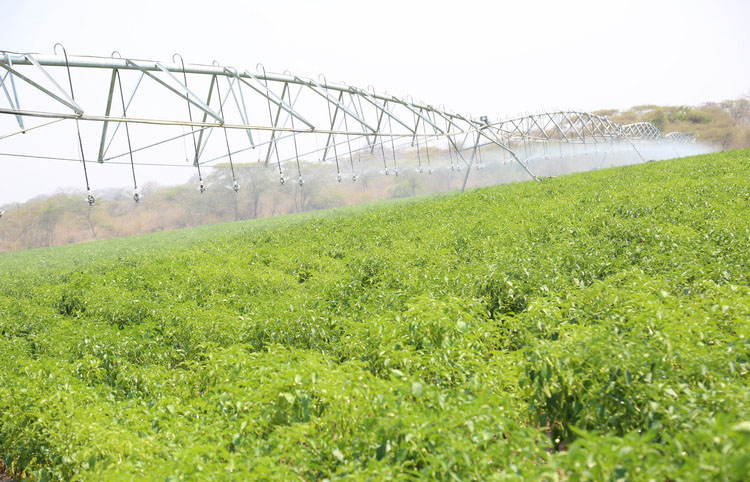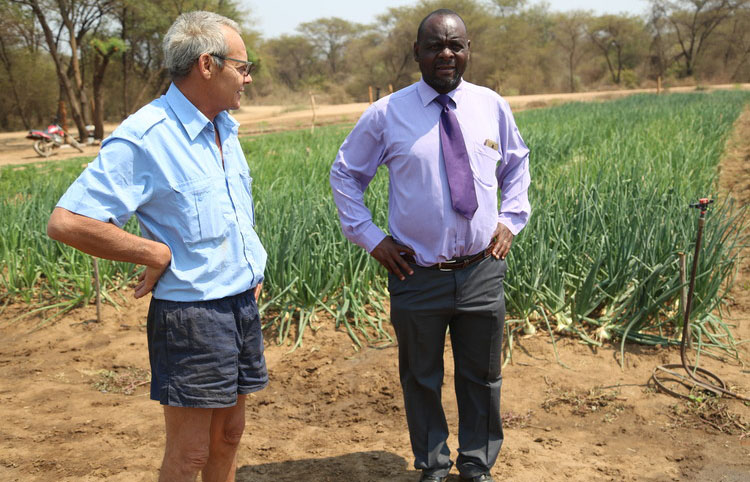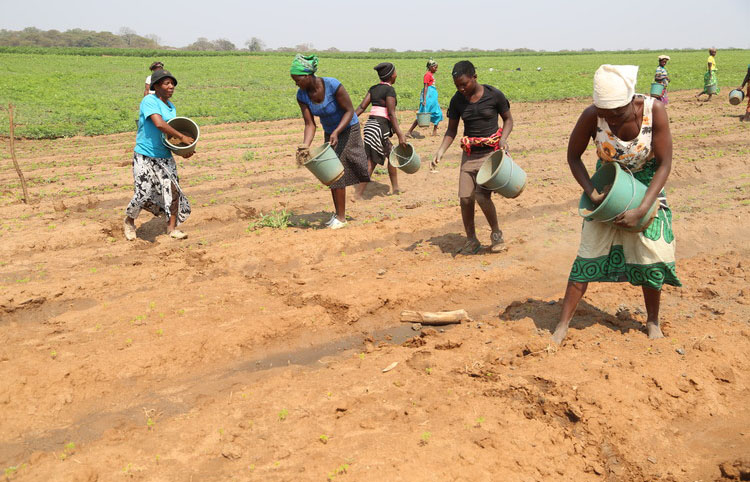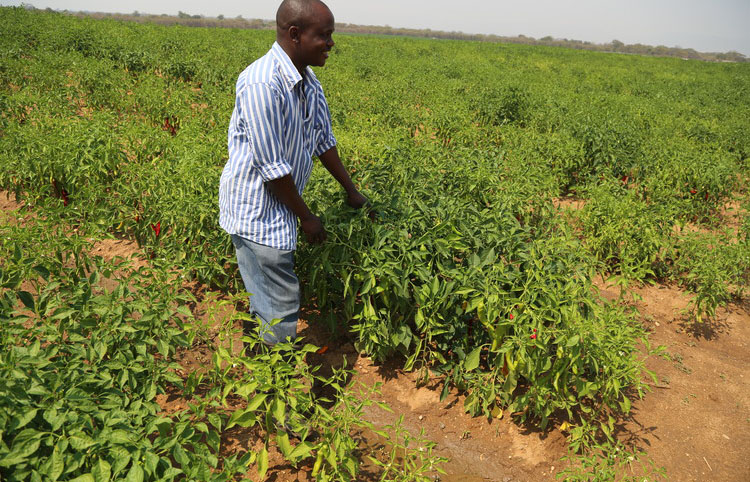
The Sunday Mail

The temperatures around Mushumbi Pools, especially during this time of the year, can be unforgiving. One can literally make a cup of some steaming coffee with water straight from the tap!
But driving from Chitsungo, just some five kilometres before Mushumbi Pools, a breeze so different from the heat hues that characterise the Zambezi escarpment, hits one’s face.
It is a cool breeze, like you have approached a massive water body, you wonder if you have suddenly neared an ocean. And there is even that unmistakable smell of wet soils everywhere.
 Lowrie Flanagan, the farm manager for Arda Mushumbi, chats with Cloudious Majaya, the chief executive officer for Mbire rural district council
Lowrie Flanagan, the farm manager for Arda Mushumbi, chats with Cloudious Majaya, the chief executive officer for Mbire rural district councilAs you raise you head to take in the surroundings, your eyes meet probably the most beautiful scenery you will have to come across in the whole of the Zambezi escarpment, an unescapable swathe of green right in the middle of the sweltering heat, the dry and hot desert that is commonly referred to as Dande.
“We are on a mission,” explains farm supervisor Themba Gunja, who offers to take us on a tour of the farm in the absence of farm manager Lowrie Flanagan, who has rushed to Mushumbi for some supplies.
“We want to revive Arda Mushumbi to even greater heights than it used to be,” further explains Gunja.
“Right now we have about 45 hectares under a centre pivot but by January we should have installed two more pivots. The stumping for that area is currently going on.
“All-in-all, this is a thousand-hectare farm and when we become fully operational, we will have all the thousand hectares under irrigation, drawing water from the Manyame River.”
Whilst to the open eye what could be striking is the hectares of green in the middle of the dry and hot Zambezi, what is more remarkable, as Gunja goes through his explanations, is that Arda Mushumbi is a wholly organic farm.
“We don’t use pesticides or herbicides here, we grow our crops organically. We have had to ferry eight 30-tonne trucks of pig manure all the way from Harare. Although the pig farmer in Harare gave us the manure for free, we had to hire the trucks to carry the load. That is how serious we are about our organic farming.”
But the surprises don’t stop with just the organic farming, Arda Mushumbi is farming several crops, most of which you probably have never heard about before.
For starters, the farm has 20 hectares of paprika, 10 hectares of moringa and another 10 hectares of chillies. That could be all about the crops that most of us are familiar with.
 On any given day, Arda Mushumbi engages the communities around it for casual work. Here, women apply pig manure on the moringa plot
On any given day, Arda Mushumbi engages the communities around it for casual work. Here, women apply pig manure on the moringa plotThen Gunja, like a man in a trance, started talking about thyme, peppermint, leek, dandelion, besel, melisa lemon mint, lemon grass, spearmint, sun hemp, caraway and camomile.
But who the heck would buy that kind of produce?
“Well,” he started to answer in a manner that showed he could have been asked the same question a thousand times over, “All the crops we are growing here are for export, Germany specifically. In fact, the major investor in the revival of Arda Mushumbi is a German national, who has a ready market for the produce.”
Besides the moringa, paprika and chillies which are already being grown on a commercial basis, the rest of the herbal crops are still being grown on a three-hectare trial plot.
“We are still trying to find out which of these herbal crops grow under these climatic conditions successfully, and those that would have passed the trial phases will move to full-scale production.”
Though priding itself in the rare organic farming model, Arda Mushumbi, in the long-term, wants to be a leading supplier of stevia, hence its partnership with Stevia Zimbabwe, in a public-private partnership.
“Stevia is the next best thing to happen to healthy living, it is already the substitute for sugar in most developed countries.
‘‘Ultimately that is what we want to grow on this thousand-plus hectare farm. But the trial period for stevia is some eight years, we need eight years to be fully sure that we can grow stevia successfully here.
“So whilst we are waiting for our eight-year trial cycle, we need to make money to keep the farm running. That is why we are growing these other healthy living crops. But in eight years’ time, if our trial project yields positive results, we will be the leading stevia producer in the country.”
In a different discussion with Cloudious Majaya, the chief executive officer of Mbire Rural District, under which the farm lies, he purred on about the economic and social impact the revival of Arda Mushumbi will have on his district.
“The economic impact is too enormous to enumerate, so will be the social impact. With some 150 casual workers called into work at any given day, and another 20 permanent workers, the economic reach of their earnings cannot be over-emphasised,” he said.
But that is not all for the Mbire community. About 2 500 communal farmers, using dry farming, are to be contracted, probably by next year, to grow roselle, yet another herbal crop.
“The roselle project should be the most exciting for us,” continued Gunja. “We are going to involve and impact the community in a far much bigger manner. If the farmers fully embrace the idea, their lives will change forever.
“The good thing is that roselle is a perennial plant and once it starts growing, there is no need to water it. So the communal farmers can tend to their other crops whilst roselle is growing. But what should be really exciting for the farmers is the fact that they will have a ready market here for the roselle.”
Besides roselle, there are huge plans for moringa, which is a popular herbal tea in healthy-seeking communities.
“Already the demand for moringa is high and we cannot even meet the demand, so there are plans to grow it with the local community.”
The other positive for the community will be the demand for cattle, pig and chicken manure by the farm.
“We cannot keep up with the costs of transporting manure from Harare, or from wherever, hence we will, at one stage or the other, have to engage the local community to supply us with manure.
“In this area, there are cases of domestic animals being attacked by wild animals, now the community has yet another motive for keeping their animals in pens for longer, they will get money for their animal droppings.”
Chitsungo Mission Hospital, some 20 kilometres away, has embarked on a biogas digester project, which when fully functional, will feed treated manure to the farm.
Flanagan, who later joined the tour of the farm, said he has many ideas in his mind as he waits for the stevia project to come to full-scale.
“How about just a hectare of onions, just to test the markets? If we do a hectare of onions, which is about half-a-million plants, how will Mbare Musika react if we were to offload that harvest at once?” he mused. “Or we could dry them for export.”
“See, this is one big greenhouse here, the climatic conditions, as long as the water is there, should be ideal for a number of crops and we are looking at the options that we have as we wait for the stevia.”
Whilst the farm is currently sun-drying its paprika, they are already building a drier for long-term purposes.
“Sun drying will be ideal during this time of the year, but when the rains come, we will not be able to sun-dry. Plus the figures we are likely to realise from our future harvests cannot be handled by sun-drying, hence the need for the drier,” said Gunja.




